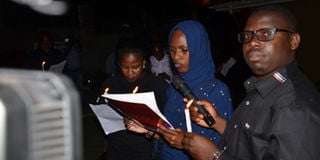Activists commemorate victims of unsafe abortion

Health activists carry lit candles in Kampala in commemoration of the thousands of girls and women who have died due to unsafe abortion. Photo by Anthony Wesaka
What you need to know:
- The 2016 Uganda Demographic and Health Survey indicates that 25 percent of the adolescent girls and young women aged 15-19 in Uganda is pregnant or a mother, which is one of the highest teenage rates in Sub-Saharan Africa.
- In Uganda teenage pregnancy has drastic and far-reaching health, developmental and economic effects at the individual, family, community and national levels.
KAMPALA. A network of civil society organizations over the weekend, joined the rest of world to mark the International Day of Safe Abortion by lighting candles in memory of thousands of women and girls who have died after undergoing unsafe abortion.
The coalition while marking the safe abortion day that is usually marked on September 28 in Kampala, appealed to government to put in place mechanisms so that no woman dies because of her reproductive choice.
“As we gather on the international safe abortion day to remember the lives of the young girls and women whose only alternative was death following the complications that emerged after carrying out unsafe abortions, we urge government to work with different stake holders to confront this public health crisis with laws and policies that respect the human rights of women,” read a joint statement by CSOs.
During the emotional candle lighting moment organized by Centre for Health, Human Rights and Development, there were heart-breaking testimonies given of what happens in the communities and referral hospitals as a result of carrying out unsafe abortions.
Ms Joyce Nakandi, a community health worker from Buikwe District, in her testimony, narrated to the activists how over five girls have so far died in her area after carrying out unsafe abortion in the backyards of their homes for fear of being reprimanded if they did it openly.
Likewise, Mary Adongo, a midwife attached to Mulago national referral hospital, narrated how they receive so many girls at the facility who have undergone unsafe abortion that has gone bad.
“Because medical workers are usually arrested and criminally held culpable for completing an unsafe abortions, some medics have resorted to not to touch these girls who have come to complete abortion for fear of dying in their hands and the repercussions that follow,” Ms Adongo narrated.
“It’s really a challenge because when you offer medical service to such women, a 999 patrol car will come for you and you end up being detained in police cells and nobody comes to your rescue,” She added.
She called upon government to allow girls who want to carry out abortion, to have it in a safe manner instead of hiding and carrying out unsafe abortions that have seen many die in the process.
Abortion is restricted in Uganda though it can only be allowed in only cases where the life of the expectant mother or/and the foetus are in danger.
The 2016 Uganda Demographic and Health Survey indicates that 25 percent of the adolescent girls and young women aged 15-19 in Uganda is pregnant or a mother, which is one of the highest teenage rates in Sub-Saharan Africa.
In Uganda teenage pregnancy has drastic and far-reaching health, developmental and economic effects at the individual, family, community and national levels.




